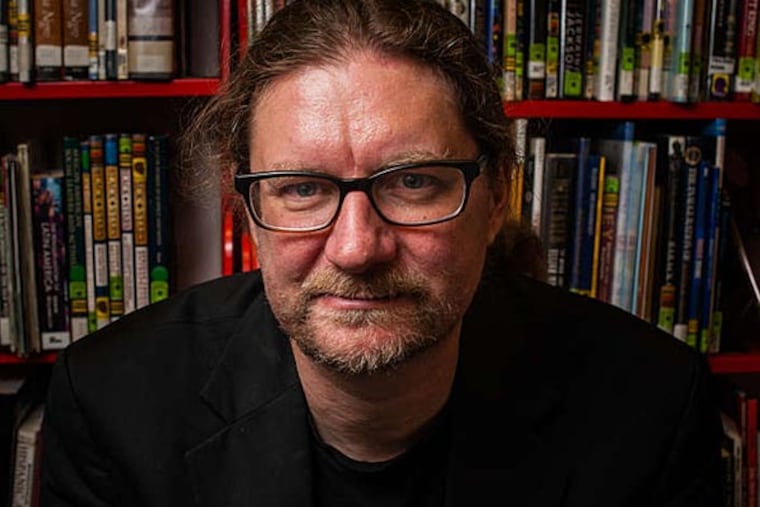Photographer brings libraries into focus
West Philadelphia-based photographer Kyle Cassidy has made a career of sidestepping political land mines as he dives deep into American subcultures. Consider, for example, his 2007 book Armed America: Portraits of Gun Owners in Their Homes.

West Philadelphia-based photographer Kyle Cassidy has made a career of sidestepping political land mines as he dives deep into American subcultures. Consider, for example, his 2007 book Armed America: Portraits of Gun Owners in Their Homes.
But in February, he published a photo essay that really touched a nerve. The subject? Librarians.
"Certainly, the gun book was much less controversial," he said.
Cassidy's photographs - taken at the American Library Association (ALA) midwinter meeting in Philadelphia and published on Slate under the title "This is what a librarian looks like" - went viral.
"My pitch to the librarians was: If I could put you in front of 50,000 people, what would you say about libraries? And 50,000 people saw it in the first few hours," Cassidy said.
Now, he has channeled that interest into a Kickstarter campaign that ends Sunday and has already raised more than $10,000. He'll use the money to photograph and interview 100 or more librarians at the ALA conference this weekend in Las Vegas.
Cassidy plans to share the images in a series of gallery shows called "Alexandria Still Burns" that will travel to libraries across the country, underscoring the institutions' value in the digital age.
That may appease some early critics. On blogs and social media, they had complained that his previous sample was younger, more diverse, and more pervasively bespectacled than an accurate cross-section of the profession would reflect. (Besides, they argued, who cares what a librarian looks like anyway? It's not the book's cover that counts.)
Cassidy sees his task as to create "candy" that will entice viewers to learn more. He's also creating a stock-photo bank for libraries to use, and a documentary about their role in the 21st century, narrated by longtime collaborator Neil Gaiman.
Before this project, Cassidy wasn't a particular library booster - or even a patron. But when a librarian invited him, via Twitter, to take photos at the Philadelphia meeting, he obliged. He'd have done the same for a convention of morticians, teachers, or sci-fi fans, he said.
"If I weren't a photographer, I'd be very happy as the guy who reads your meter and gets to come into everyone's houses," he said. "To meet a lot of people and learn about their lives is the most fascinating thing in the world to me."
So he was drawn in by the librarians, and their passion for knowledge and its dissemination.
"These librarians are fighting desperately sometimes. And I don't think it's hyperbole to say this: They're fighting for civilization," Cassidy said.
He learned that librarians sometimes felt besieged and abandoned in the era of Google. The apathy of those who'd stopped using libraries made them a target for budget cuts.
But library cutbacks, Cassidy said, have "pulled the rug out from under an entire group of people who use libraries for not just books but as community centers, as places that have air-conditioning, chess lessons, and knitting circles, and, maybe more important, places that provide Internet access."
(In Philadelphia, many school libraries remain shuttered. City libraries, which had seen a 20 percent budget cut in 2008, are finally on track to get a $2.5 million bump this year, enough to restore six-day-a-week service to all branches. Mayor Nutter fought back tears in March as he told reporters that the increase would rectify his 2008 budget cut, "the absolute worst decision" of his public-service career.)
Cassidy still doesn't see himself as a library activist, but he does want to provide a tool kit for librarians to tell their stories.
He'll be working with Friends of the Free Library to shoot fresh stock photos, fulfilling a list of requests from librarians, such as images depicting racial diversity, reflecting the broad range of things librarians do besides get books - and avoiding the cardigan-glasses-bun combination, the deadly trinity of librarian stock photos.
Tessa Renshaw, the Friends' community outreach director, plans to connect Cassidy with members of library friends groups around the city. "Each community library is such an amazing introspective into each neighborhood," she said. "My hope is to link him up to these true library lovers."
More than 200 librarians have already expressed interest in being photographed at the ALA conference.
For Megan Threats, a public service and research librarian at the AIDS Library of the service organization Philadelphia FIGHT, being photographed by Cassidy in January was a chance to finally explain to the world what it is she does for a living: a mix of social services, computer training, and compiling research on public-health issues.
"I want to get the message out that librarians come in many different forms," she said. "There are some that are attorneys, some that have PhDs. . . . People come to the specialty in various different ways."
ALA membership specialist Tina Coleman said the exhibitions will continue a vital conversation begun when the images were first published.
"It started such a great discussion within the library community and within the public at large about librarians and library advocacy, and what the library itself means to people," she said.
An irony in this is that the same forces of digital information consumption that are shaking up the world of libraries are what made Cassidy's project possible. It's his sixth successful Kickstarter campaign, sustaining work that once might have been funded in advance by magazine or book editors.
He said it's not surprising that, even at such a challenging time for libraries, people would rally around the project.
"It's rare in this world to find clear boundaries between right and wrong - but, in this case, libraries are right," he said. "When you find a gem like that, you pick it up."
215-854-5053
@samanthamelamed